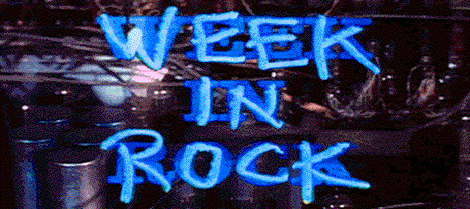
Hi, I'm Kurt Loder. Welcome to "The Week in Rock."

In computer world, having just emerged from a year in which national magazines ran "cyber-porn" scare stories and Congress began grumbling vaguely about an Internet morals crackdown, much to the dismay (or sometimes amusement) of 'Net vets -- the freewheeling, worldwide
 computer hookup is now drawing some serious attention from one of the world's foremost anti-hate groups. This week, the Simon Wiesenthal Center in Los Angeles -- founded by the renowned Austrian Nazi hunter -- sent a formal letter to dozens of US on-line services such as CompuServe and America Online imploring them not to provide access to hate mongers, racists, anti-semites, and other cyber-trolls. Rabbi Abraham Cooper, the letter's author, proposed the adoption of what he called "an Internet provider's code of ethics" which would commit on-line companies to "refuse service to those individuals and groups who seek to use this technology to mainstream their agenda of hate." The Wiesenthal Center has relentlessly documented the postings of organized neo-Nazis on the Internet and given the Jewish experience with Nazis only fifty years ago, would understandably like to hinder their rantings in every way possible. But the American tradition of freedom of speech is based on the assumption that sunshine, not suppression, is the best disinfectant for hate merchants and many Internet enthusiasts contend that any attempt to block even the most appalling free speech on-line is not only unconstitutional -- at least in spirit -- it's also futile. Author David Bennahum -- who's writing a book called "coming of age in cyberspace" -- and Gerry Michalski -- who edits the computer newsletter "Release One Point Zero" -- put it this way.
computer hookup is now drawing some serious attention from one of the world's foremost anti-hate groups. This week, the Simon Wiesenthal Center in Los Angeles -- founded by the renowned Austrian Nazi hunter -- sent a formal letter to dozens of US on-line services such as CompuServe and America Online imploring them not to provide access to hate mongers, racists, anti-semites, and other cyber-trolls. Rabbi Abraham Cooper, the letter's author, proposed the adoption of what he called "an Internet provider's code of ethics" which would commit on-line companies to "refuse service to those individuals and groups who seek to use this technology to mainstream their agenda of hate." The Wiesenthal Center has relentlessly documented the postings of organized neo-Nazis on the Internet and given the Jewish experience with Nazis only fifty years ago, would understandably like to hinder their rantings in every way possible. But the American tradition of freedom of speech is based on the assumption that sunshine, not suppression, is the best disinfectant for hate merchants and many Internet enthusiasts contend that any attempt to block even the most appalling free speech on-line is not only unconstitutional -- at least in spirit -- it's also futile. Author David Bennahum -- who's writing a book called "coming of age in cyberspace" -- and Gerry Michalski -- who edits the computer newsletter "Release One Point Zero" -- put it this way.
GERRY P. MICHALSKI: There are fascinating international legal implications to what's going on here. The Internet, because of its such broad connectivity, potentially means that law goes to the lowest common international denominator. That if you're offended by a server in Iowa, they could move
the server to Sweden or the Caribbean and do what banking has done with banking shells and so on and so forth, and just move things to where the laws are appropriate.
DAVID BENNAHUM: You know, this network was always designed to be able to reconfigure itself and actually survive a nuclear war. So the small attacks of censorship compared to, say, a nuclear war are easily handled by this network. And so it's very easy for people to bypass potential roadblocks that service providers put up. I mean, ultimately, if you want to really censor the Internet, you should just shut down the whole network because anything short of that is totally ineffective. Which raises a really important point, which is that if there is no way to really censoring the Internet short of shutting it down, then we should be having a mature conversation about, "OK, how do we have our cultural values and some of our legitimate concerns mediated within this network?"

Congressional enthusiasm for cleansing the Internet has waned in the face of the more pertinent budget wrangle, and the gigantic bill that Congress was preparing has been put on a back burner -- providing additional time for the generally middle aged politicians to learn a lot more than they appear to know now about the complex entity they dream of regulating.
© 1996 MTV.
